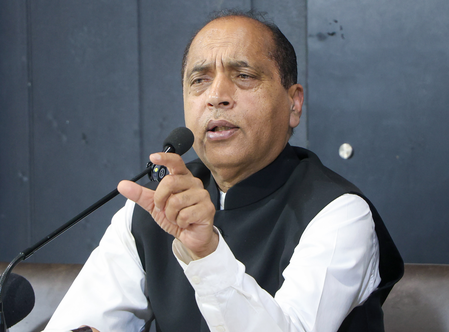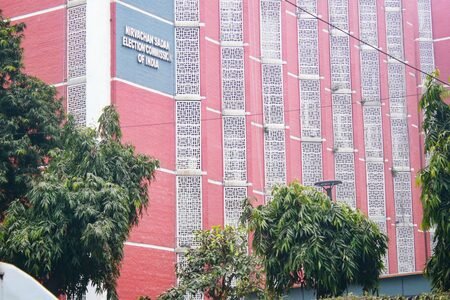That night, on August 11, 2008, villagers of Anasagaram, situated in Andhra’s Krishna district, were in for a rude shock.
“They just dragged him (Satyam) and took him in the dead of the night. By the time news spread in the village, he was gone,” says Balayya, a resident of Nandigama, an adjoining village.
Satyam Babu, who just returned to his village after almost a decade, was released from the Rajahmundry Central Prison in Andhra Pradesh on Sunday, after he was acquitted by the Hyderabad High Court in the Ayesha Meera murder case.
Pharmacy student Ayesha Meera was raped and murdered in 2007 in Ibrahimpatnam, and almost a year later, Satyam Babu was charged with the crime. He was convicted by a Vijayawada Women’s Special Sessions Court in 2010, and sentenced to imprisonment for life.
However, even family members of the victim, as well as several activists, had alleged that Satyam was framed to let a powerful politician’s relative off the hook.
After a decade-long legal battle, the HC acquitted him and directed the Andhra Pradesh government to pay Rs 1 lakh compensation to him. He had spent eight years in jail without any evidence of his involvement.
Recalling the night he was picked up, Satyam says, “They searched my house, but didn’t find anything. Then, they told my mother that I would be back the next morning, and whisked me away. It happened so fast.”
Satyam then alleges that he was taken to Paritala by the police, which is around 25 km away, and lodged in a certain resort. He also hints that he was beaten by the police, but doesn’t directly say so.
“They did certain things to make me ‘confess’ a crime I had never even heard of,” he says. Thus began a 9-year long journey of then 22-year-old Satyam, who spent his entire youth in jail, claiming his innocence throughout the sentence that he served.The Crime
The date was December 27, 2007, and the state woke up to shocking news of a brutal rape and murder of Ayesha Meera, a pharmacy student residing in a private hostel in Ibrahimpatnam.
Ayesha’s head was reportedly banged against a wall, and the police said that they had found a ‘love letter’ at the scene, along with the word ‘Chirutha’ (leopard) written on the victim’s chest.
The parents of the victim, Shamshad Begam and Iqbal Basha, alleged that former Congress Minister Koneru Ranga Rao’s grandson, Koneru Satish, frequently visited the hostel along with other relatives including Koneru Suresh, Abburi Ganesh, Chinita Pawankumar and Rakesh.
Alleging that the warden, Koneru Padma, allowed them to enter the girls’ hostel as they were relatives, Begum squarely laid the blame of Ayesha’s murder on them.
Who is Satyam Babu?
Satyam Babu was born in the very same village that he has now gone back to.
Studying till Class 5 at the Anasagaram government school, he completed his class 7 at a high school in Nandigama, following which he discontinued his studies.
“My father was an agricultural labourer, and I was born to my parents, 11 years after their marriage. So, he was quite old, and I decided to quit my studies and look for work. I didn’t understand the value of education back then either,” he says.
Satyam was a big fan of cricket, with several locals detailing how they would play the sport for hours with them, on the premises of the church in the village.
In fact, the night before Ayesha’s murder, several locals swear that he was attending Christmas celebration at the very same church, and had even named the song that he danced to, in unison.
“In fact, when he was in the midst of a dance, his pant tore from behind and he was very embarrassed. I still remember,” says Kumari, another local, who stayed opposite Satyam’s old house.
The Case
Satyam says that he didn’t even know about the case, until he was arrested for it.
“To be honest, I started reading the newspaper only after I went to jail. I had no clue about the case before that,” he says.
Satyam, who was a mason before going to jail, says that he had gone to work at a cement factory in Jaggayyapet on the day that Ayesha was murdered. “It was a normal day. I came back home, ate and slept,” he says.
Following the murder, the police picked up several suspects, but released them soon thereafter due to reported lack of evidence.
The police even questioned Ayesha’s own uncle, but was not able to prove anything. The police claims were even rubbished by the girl’s parents.
Activists had alleged that the administration was just trying to do everything it could to protect well-connected people.
After arresting Satyam, the police claimed that he was involved in several other cases in and around Ibrahimpatnam. “He was framed. He had one case pending on a cell phone theft. However, since a person with such little criminal background couldn’t possibly commit such a brutal crime, the police started submitting fabricated ‘proof’ and filed a bunch of other cases on him,” says Srinivas Rao, one of Satyam’s lawyers, who had fought the case since the latter was picked up.
“They created fake FIRs saying stating that he was a serial offender, and was known to break into hostels and harass women in the night,” Rao adds. Satyam, also maintains the same.
At the time, there were forensic reports of semen, hair and footprints that the police submitted as proof in court.
“They did make me take the tests, but if they can register false FIRs, and had political support at the time, faking a forensic test is not so hard either,” Satyam alleges. He also claims that the doctor who conducted the test was arrested by the ACB in 2010, for taking a bribe.
The Trial
“They put me in judicial remand, and then the trial began. That’s when my legs started to fail,” Satyam says. Satyam was later diagnosed with GB Syndrome, which badly affected his nervous system and left his two legs almost paralysed.
While his family and friends say that the disorder came about due to being thrashed by the police, and put under extreme stress, Satyam says that he is unsure. “I’m not sure why or how it happened. I just remember that I was in pain. My legs refused to cooperate with me, and even climbing a small step was a herculean task.” he said.
By September 29, 2010, Satyam’s legs had completely failed. “I was taken into court on a wheelchair. Even on that day, I was sure that justice would win, because I was innocent. The guilty verdict shocked me. It felt like I was plunged into a dark place with no escape,” he says.
“I had told the judge that my family was dependent on me, but it was of no use. When she asked me if I wanted the life sentence or death penalty, I asked her to give me the latter, because I didn’t see a reason to live anymore,” he adds.
A youth in prison
“Since I wasn’t well, I spent my first night in the hospital inside the Rajahmundry prison. I was lost and blank. A court had just declared me guilty of a crime that I didn’t commit. I had lost my battle,” Satyam says.
For the next one year, Satyam shuffled between the Rajahmundry prison and the Cherlapally jail in Hyderabad, as he underwent treatment at KIMS hospital in the city.
Satyam says that he was given a few medicines, and lots of physiotherapy, following which his legs slowly recovered, and he could walk again. “From 2012, I started working at the steel plant workshop in prison and also enrolled for a degree in Telugu, at the Dr. BR Ambedkar Open University via distance education,” he adds. This was the same year that Satyam officially joined the other prisoners at the barracks.
“It was a learning experience for me. I was in a room with roughly 25 other people, and I learnt how to communicate with others, and exchange knowledge during conversations,” he says. Satyam’s days in prison began and ended with reading his bible prayers, besides working during the day, and his education on the side. “In the evenings, we would play chess or carom. However, there was one TV for the entire ward, and the days when they showed a cricket match, were my favourite,” he says.
Looking ahead
When Satyam stepped out of the jail premises on Sunday morning, a large gathering of media persons, lawyers, policemen and leaders of a few Dalit organisations awaited him. “I am very grateful to all those supported me. Today, justice has won, and god is on my side. I’m extremely happy,” he had declared to the cameras.
“It was funny in a way,” says Satyam, flashing a smile and elaborating on his release. “Usually, only politicians get such welcomes, and I’m just a normal person who was given a hero’s welcome.”
Satyam is now asking for a means to earn a livelihood, so he could build his life back together. The family also claims that their old house burned down a year ago, and they could use help from the state, to build a new one.
“I want to express my gratitude to my entire village. They all came charging at the police station with sticks after my arrest, and put continuous pressure on the administration. However, there are two people who I am even more indebted to,” he says, “If Ayesha’s parents were not there during that time, there would be no Satyam Babu today. I am forever grateful to her mother, for defending me, and standing for the truth.”









